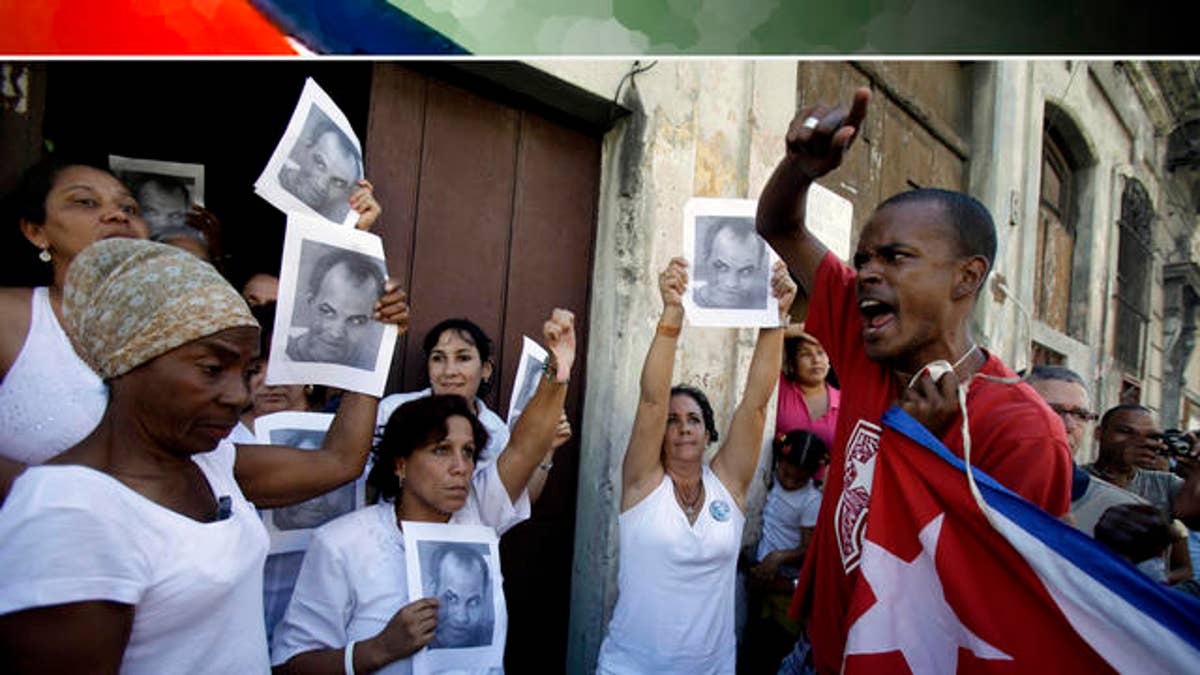
A government supporter, right, chants revolutionary slogans as members of dissident group Ladies in White hold up images of late dissident Orlando Zapata Tamayo on the first anniversary of his death in Havana, Cuba, Wednesday Feb. 23, 2011. Ladies in White is a group of relatives of Cuban dissidents who were or are still imprisoned. (AP Photo/Javier Galeano) (AP)
What is the value of speaking your mind without fear? For Cuban dissident leader Laura Pollán it was life itself. She died on Monday October 17, 2011, reportedly of respiratory failure in Havana’s Calixto Garcia hospital.
The intrepid 63-year old Pollán, a former schoolteacher, first came to prominence for organizing a group of women whose husbands, brothers, and sons had been condemned to some of the sternest sentences in the regime’s history. The Black Spring of 2003, as it became known, was roundly denounced by supporters of human rights around the world. Former presidents Lech Walesa of Poland and Vaclac Havel of the Czech Republic, themselves jailed for defying dictatorship, raised their voices demanding the release of the 75 prisoners of conscience. In 2003 Pollán, whose husband Hector Maseda was among the political prisoners, organized a weekend march known as the Ladies in White, who dared exercise their right to protest and peaceably assemble presenting their grievances against the dictatorship of the Castro brothers.
The response was rapid and ferocious: the women were repeatedly assaulted by government-organized “shock brigades,” claiming to represent the ire of the popular masses against “counter-revolutionaries, in the pay if the U.S. empire.” These thugs also took up intense harassment, occupying the sidewalks outside Pollán’s home on Havana’s Neptuno Street. During one of the Ladies in White peaceful marches through Havana, video cameras show them being physically attacked before police arrest them, not the attackers, and piling them into a bus to be hauled off to jail. At one point it became unclear whether the police or the mob did more physical harm to the women. Thanks to the Internet, the world saw for itself who the peaceful dissidents were and where the violence originated.
Asked repeatedly if the attacks would stop the Ladies in White from marching, Pollán merely announced the next march and encouraged more women to join them. And join them they have. Over the years, repudiation has replaced fear as more of Cuba’s women have draped themselves in white and marched, flowers in hand, under Cuban flags to pay homage to fallen comrades like Osvaldo Zapata Tamayo who died in a hunger strike fighting for his right to be a free man.
Pollán and her sisters, like the men who prefer prison to silence, clearly crossed the line set for them by the dictatorship. Dictatorships the world over depend on the people’s fear to keep them in step. Pollán, and increasing numbers of Cubans, have lost fear of the regime and some have even lost the fear of death, leaving the regime with fewer and fewer options. Once people lose their fear, and especially the fear of death, there is little to hold them back.
The history of resistance in Cuba and elsewhere teaches many lessons. First, that freedom is not some abstract term used in philosophical discourse, but rather it is the right to speak one’s mind without fear of reprisals, arrests, or physical harm. Secondly, that we are always free to the extent that we refuse to cooperate with our oppressors provided we are ready to accept the consequences. Finally, as our brothers and sisters in Eastern Europe learned, once we all stop cooperating the forces of repression fall of their own weight like a house of cards.
In Cuba, faced with resistance, the regime usually calls a mass demonstration or a march in which millions walk to the US Interest Section and the same speakers denounce the empire. The marches are a mass catharsis for a population completely alienated from a system that denies them the right to follow their individual dreams and that repeatedly postpones the benefits of the revolution for which they are daily asked to sacrifice. Such marches serve as a collective whistling through the graveyard.
If one wanted to play psychologist, the “rapid response” brigades are taking out their anger against a group of non-resisting women, because they can’t slap the bribe-seeking cop, or strangle the Party hack who checks their child’s education for lack of “revolutionary enthusiasm.” Who knows, maybe a punch at a dissident’s face is a displaced reminder of their own inability to change anything.
In a sublime act of cynicism Stalin once told his associates that the death of single individual was a tragedy, but that the death of millions was merely a statistic. Likewise, being able to mobilize “shock brigades” or massive demonstrations are but statistics, the death of a courageous woman like Laura Pollán is indeed a tragedy.
Fernando Menéndez is an economist and principal of Cordoba Group International LLC.
Follow us on twitter.com/foxnewslatino
Like us at facebook.com/foxnewslatino




